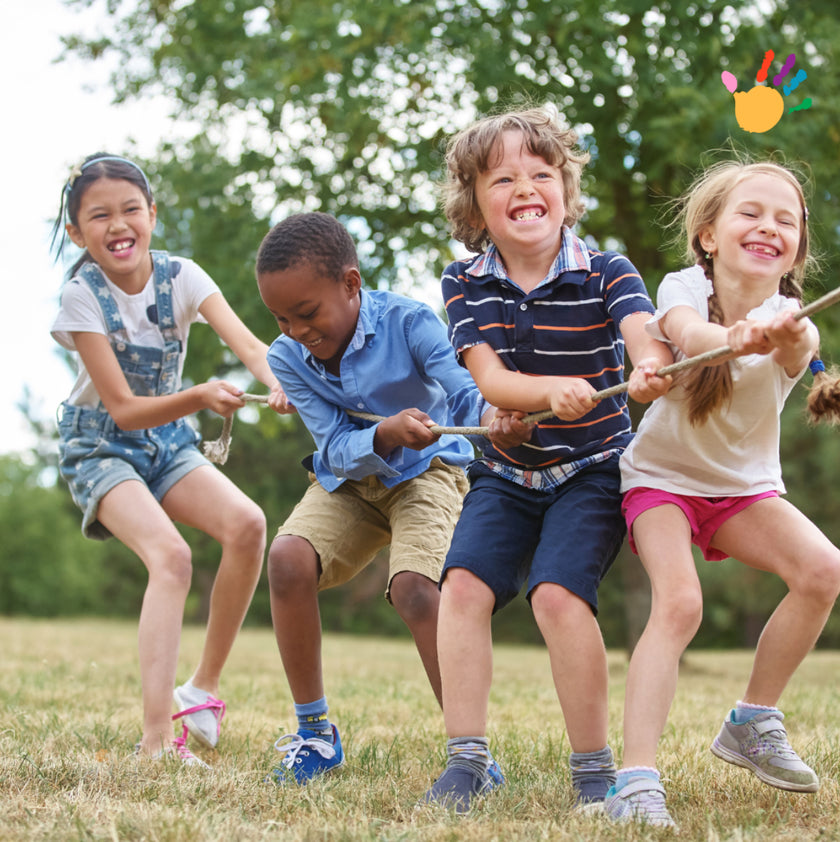Playtime is a crucial part of childhood that goes beyond just having fun. It's a time when kids develop important social skills that they'll use throughout their lives. Group play, in particular, offers a fantastic opportunity for children to learn how to interact with others, share, take turns, and solve problems together. In this blog, we'll explore how group play helps build social skills and why it's so important for your child's development.

Learning to Share
One of the first social skills that children learn during group play is sharing. Whether it's sharing toys, snacks, or even space, kids quickly realize that they can't always have everything to themselves. This lesson is crucial because it teaches them to be considerate of others and to understand the concept of fairness. For example, if two children want to play with the same toy, they might decide to take turns. This simple act of sharing helps them understand the importance of cooperation and the joy of playing together.
Taking Turns
Taking turns is another essential skill that children develop during group play. This is closely related to sharing but involves a bit more patience and understanding. When playing a game, kids learn that they need to wait for their turn and that everyone will get a chance to participate. This teaches them to be patient and to respect others' time and effort. It's a skill that will be useful in many areas of life, from classroom activities to workplace collaborations.
Communicating Effectively
Group play often requires children to communicate with each other. Whether they're planning a game, discussing rules, or resolving a conflict, they need to express their thoughts and listen to others. This helps them develop effective communication skills, which are essential for building relationships and working with others. Through play, kids learn to use words to express their feelings, ask for what they need, and understand others' perspectives.
Solving Problems Together
Children often encounter challenges during group play, such as disagreements over rules or how to complete a task. These situations provide a perfect opportunity for them to develop problem-solving skills. By working together to find a solution, kids learn to think critically, negotiate, and compromise. These skills are invaluable not only in social interactions but also in academic and professional settings.
Building Empathy
Empathy is the ability to understand and share the feelings of others. Group play helps children develop this important skill by encouraging them to consider others' emotions and viewpoints. For example, if a child notices that a playmate is upset, they might offer comfort or try to include them in the game. These small acts of kindness help children develop a sense of empathy and compassion, which are essential for building strong, positive relationships.
Boosting Confidence
Participating in group play can also boost a child's confidence. When children successfully navigate social interactions, solve problems, and make friends, they feel a sense of accomplishment. This boosts their self-esteem and encourages them to take on new challenges. Confident children are more likely to participate in group activities, take on leadership roles, and form healthy relationships.
Encouraging Inclusivity
Group play provides a wonderful opportunity to teach children about inclusivity. By encouraging your child to play with others who may be different from them, you're helping them learn to appreciate diversity. This can include playing with children of different ages, backgrounds, or abilities. Inclusivity teaches children to respect and value differences, fostering a more accepting and compassionate attitude.
The Role of Caregivers
As a caregiver, you play a crucial role in facilitating group play and helping children develop social skills. Here are a few tips to support your child's social development through group play:
- Provide Opportunities: Create opportunities for your child to play with others, whether it's through playdates, group activities, or community events.
- Model Behavior: Show your child how to share, take turns, and communicate effectively by modeling these behaviors yourself.
- Encourage Participation: Encourage your child to participate in group activities and gently guide them when they encounter challenges.
- Praise Efforts: Acknowledge and praise your child's efforts to share, take turns, and solve problems. Positive reinforcement helps build confidence and encourages them to continue practicing these skills.
Group play is more than just a fun activity for children—it's a powerful tool for building essential social skills. By learning to share, take turns, communicate effectively, solve problems, build empathy, boost confidence, and embrace inclusivity, children develop the foundation they need for successful social interactions throughout their lives.



 DimpleBee.
DimpleBee.